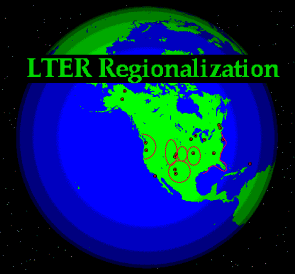
 |
LTER Site Regionalizations |
|---|
In our Regionalization Workshop, the need for regional perspectives was articulated and nature of the task of defining appropriate regional contexts for LTER sites was discussed. We concluded that sound scientific justification for delineation of regions around each LTER was the critical step in formulating a long-term plan for LTER research at the regional scale. The workshop concluded with the action item being the development of this electronic publication on LTER REGIONALIZATION which would detail the basis for LTER regions and display the geography of each sites region. We expect that when completed it will form the basis of a hard copy edition of the same for wider distribution.
It should be emphasized that LTER research when applied at the regional scale over the time period of the coming decades will put in place a strategic research infrastructure that will be needed to understanding the dynamics of ecosystems and landscapes and for solving environmental problems of the next century. The environmental issues confronted in the second half of the 20th century approached the problem from the perspective of stressor, impact and mitigation. The environmental issues of the coming century will be resolved at the system level. Environmental problems within landscapes and ecosystems will, of necessity, be approached from within regional perspectives. With a regional perspective, the LTER sites and the LTER Network will become a distributed center for the strategic research required to meet these challenges.
For more information about the U.S. Long-term Ecological Research Program, browse the LTERNET WWW or LTERNET Gopher systems.